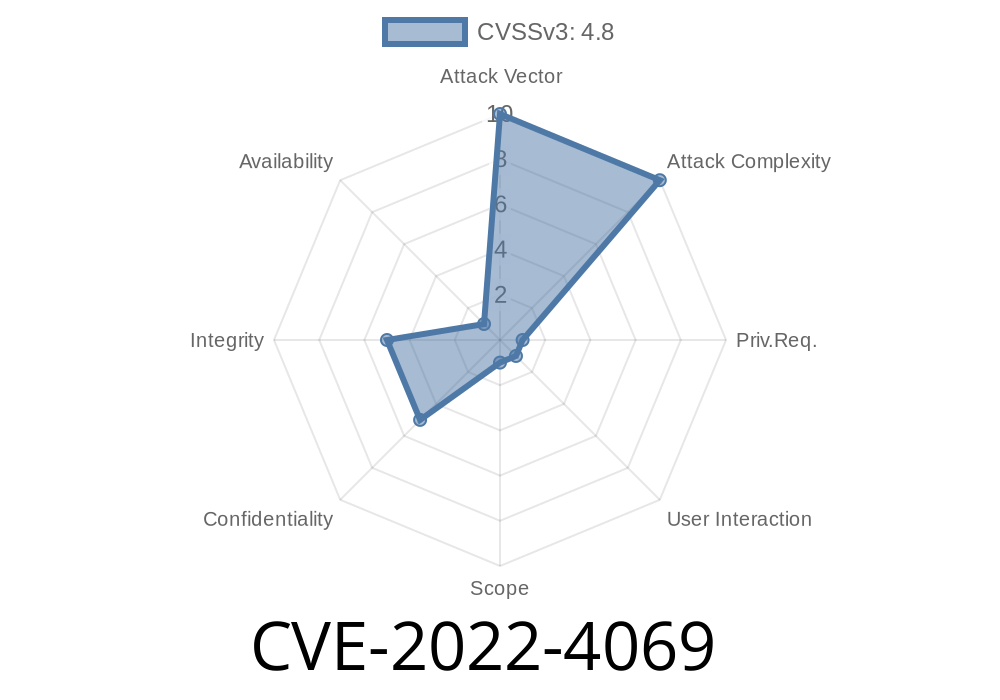LibreNMS is a popular open-source network monitoring tool, used by organizations to keep an eye on their networks and devices. However, like many web applications, it hasn’t been immune to security vulnerabilities. One such critical issue is CVE-2022-4069 – a Cross-site Scripting (XSS) flaw found in LibreNMS versions before 22.10..
In this exclusive deep-dive, we’ll explain what this flaw is all about, how it can be exploited, and how to fix or mitigate it. Whether you’re a network admin, sysop, or just learning about web security, you’ll find all the info you need – with code samples, how-tos, and links to original sources.
What is CVE-2022-4069?
CVE-2022-4069 is an identifier for a security vulnerability: specifically, it’s a “Generic Cross-site Scripting (XSS)” problem detected in the librenms/librenms GitHub repository. It affects all versions released before 22.10..
What Is Cross-site Scripting (XSS)?
XSS happens when an attacker manages to inject malicious JavaScript into web pages viewed by other users. Successful exploitation can let an attacker steal cookies, take over sessions, or mislead users through fake content.
How Did CVE-2022-4069 Work?
According to the original advisory:
> An XSS vulnerability exists in LibreNMS before 22.10., impacting some web interface variables that weren't properly sanitized. An attacker could trick another user into visiting a crafted link, causing their browser to run unwanted scripts.
The precise routes or variables weren’t disclosed in the GitHub advisory, but common targets are
- URL parameters (GET/POST)
Proof of Concept (PoC): Exploit Example
Here’s a simulated PoC to help you understand how an attack might look — do not attempt this on a live system without permission!
Suppose a vulnerable URL looks like this
https://your-librenms-instance/device.php?device=1234&name=[user-supplied-value]
If the name parameter is shown on the page without sanitizing, an attacker could send a link like
https://your-librenms-instance/device.php?device=1234&name=%3Cscript%3Ealert('XSS')%3C%2Fscript%3E
which decodes to
https://your-librenms-instance/device.php?device=1234&name=<script>alert('XSS')</script>;
If the page displays the name like
<?php echo $_GET['name']; ?>
…the browser will execute the <script> tag, showing an alert.
Example PHP Snippet (Vulnerable)
<!-- BAD: No output escaping -->
<span>Name: <?php echo $_GET['name']; ?></span>
Example PHP Snippet (Fixed)
<!-- GOOD: Escaping for HTML output -->
<span>Name: <?php echo htmlspecialchars($_GET['name'], ENT_QUOTES, 'UTF-8'); ?></span>
Perform actions as the user (via CSRF, if protections are insufficient)
In short: a successful XSS lets an attacker “be” that user in the web app – very dangerous if the target is an admin!
How Was It Fixed?
The LibreNMS team addressed CVE-2022-4069 in pull request #14574, released as part of the 22.10. update. The fix involves escaping all user-controllable output before it’s rendered in the browser.
Sanitizing output means that special HTML characters (like <, >, ", ', &) are converted to harmless forms. For PHP, that’s usually done with htmlspecialchars() as shown above.
How to Protect Your LibreNMS Instance
Step 1: Make sure you’re running LibreNMS 22.10. or later
Upgrade notes: Upgrade LibreNMS
Step 2: Disable public registration and access wherever possible
Lockdown the install to trusted users/IPs
Step 3: Always use strong, unique passwords for admin accounts
Step 4: Use a web application firewall (WAF) if possible
Step 5: Regularly review the LibreNMS security advisories
References and Resources
- CVE-2022-4069 at NVD
- LibreNMS Security Advisory
- LibreNMS 22.10. Release Notes
- Generic XSS Explanation (OWASP)
- LibreNMS on GitHub
In Conclusion
CVE-2022-4069 highlights why output sanitization is so crucial in any web app. Even popular tools like LibreNMS can have bugs that let malicious actors slip by. If you use LibreNMS, update now and encourage your team to stay on top of security news.
*Stay safe, keep your monitoring secure, and don’t get caught by the next XSS!*
Timeline
Published on: 11/20/2022 05:15:00 UTC
Last modified on: 11/21/2022 13:42:00 UTC
